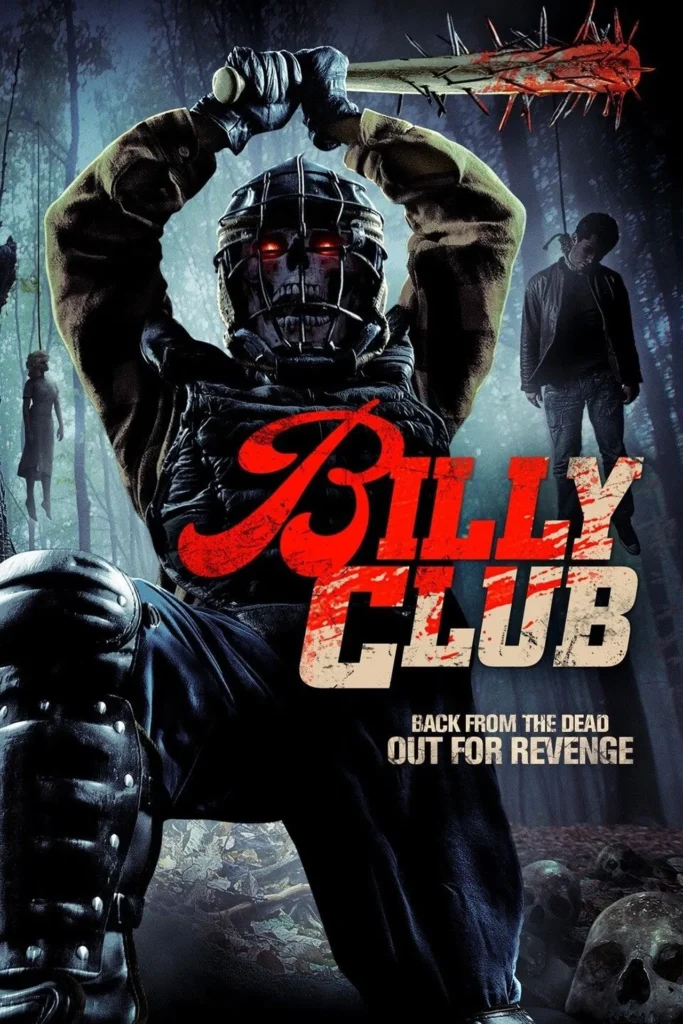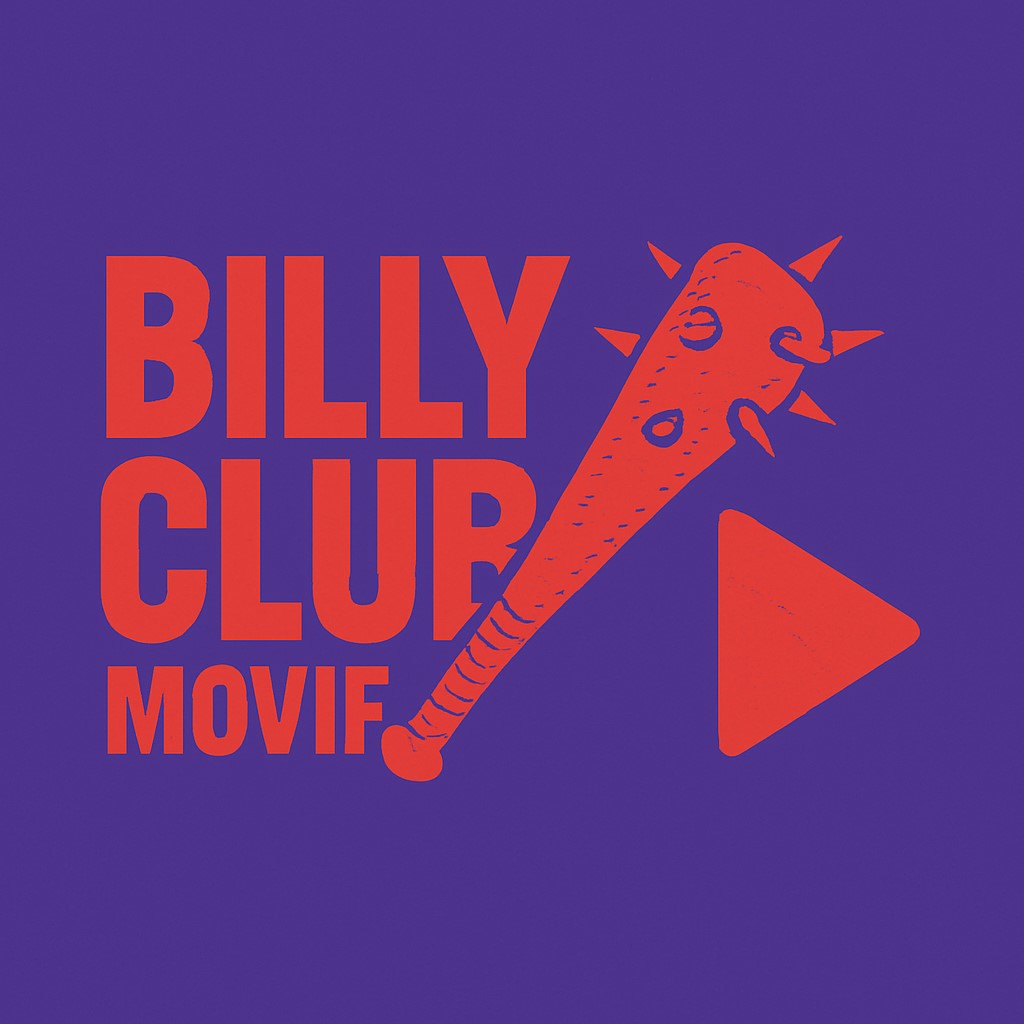
Directors: Drew Rosas, Nick Sommer
Genre: Horror, Comedy
Runtime: 94 minutes
Language: English
IMDb Rating: 4.5/10
Plot: When Past Sins Return to the Field
Billy Club follows four childhood friends—Bobby Spooner (Marshall Caswell), Alison McKenzie (Erin Hammond), Kyle Tripper (Nick Sommer), and Danny Evans (Max Williamson)—who reunite 15 years after a tragic Little League incident that left their coach and two teammates dead. Their attempt to commemorate the past turns deadly as a masked assailant, donning an antique umpire’s mask and wielding a modified baseball bat, begins hunting them down, forcing the group to confront buried secrets and survive a game they thought had ended.
Billy Club takes the nostalgia of childhood memories and twists it into a brutal, blood-soaked nightmare. What begins as a reunion of old friends quickly spirals into a macabre game of vengeance, blending slasher terror with psychological guilt. The film’s eerie Americana and inventive kills make it a cult gem among horror fans — the kind of dark thrill that fits perfectly on Goojara website, where audiences flock to rediscover indie slashers with bite. Beneath the gore, Billy Club is a story about regret, reckoning, and the ghosts that never really leave the field — a twisted reminder that some innings never truly end.
Visual Style: A Blend of Retro Aesthetics and Modern Gore
Directors Rosas and Sommer pay homage to 1980s slasher films, incorporating familiar tropes such as isolated cabins, masked killers, and inventive death scenes. The film’s cinematography utilizes the wooded landscapes of northern Wisconsin to create an eerie backdrop, effectively capturing the nostalgia of summer baseball while juxtaposing it with gruesome horror elements. The killer’s unique attire—a vintage umpire’s mask—and weapon—a nail-studded baseball bat with a retractable bayonet—add distinctive visual flair to the genre.
Cast: Embodying Archetypes with a Twist
Marshall Caswell (Bobby Spooner): Portrays the introspective protagonist grappling with past guilt and present terror.
Erin Hammond (Alison McKenzie): Delivers a performance balancing strength and vulnerability, embodying the ‘final girl’ trope with nuance.
Nick Sommer (Kyle Tripper): Provides comic relief and complexity, navigating themes of identity and redemption.
Max Williamson (Danny Evans): Depicts the affable friend whose loyalty is tested under duress.
The ensemble cast effectively channels the spirit of classic slasher characters while infusing them with contemporary depth.
Themes: Confronting Bullying, Guilt, and Revenge
At its core, Billy Club explores the long-term effects of childhood bullying and the cyclical nature of violence. The narrative delves into themes of guilt and redemption, as the characters are forced to face the consequences of their past actions. The film also examines the impact of trauma on personal growth and the dangers of unresolved grievances.
Reception: A Mixed Bag of Nostalgia and Critique
Billy Club has garnered a range of responses from critics and audiences. Some praise its inventive kills and affectionate nods to the slasher genre, noting that “movies like Billy Club are making me think otherwise” about the need for big-budget productions to revive the genre. Others critique its pacing and tonal inconsistencies, with observations that the film “tries to do comedy from time to time… but it never did that.” Despite its imperfections, the film has achieved recognition at various film festivals, winning awards such as “Best Feature” at the Hollywood Horror Fest and “Best Horror Film” at the Phoenix Film Festival.
The Critic’s Verdict
Billy Club offers a heartfelt tribute to 1980s slasher films, blending nostalgia with original elements. While it may not hit a home run in every aspect, its creative kills, thematic undertones, and dedication to the genre make it a worthwhile watch for slasher enthusiasts.
Rating: 6/10
A commendable indie slasher that swings for the fences, delivering both hits and misses.
Pair With
The Final Girls (2015) for a meta-horror experience, or Happy Death Day (2017) for a modern slasher with a comedic twist.
Cultural Footprint
By integrating America’s pastime into the horror genre, Billy Club carves a unique niche, demonstrating the versatility of slasher narratives and contributing to the ongoing revival of indie horror films.
Addition
In addition to its thematic exploration of guilt and revenge, Billy Club distinguishes itself through its inventive use of baseball motifs within the horror genre. The killer’s unique weapon—a nail-studded baseball bat with a retractable bayonet—exemplifies the filmmakers’ commitment to blending sports imagery with slasher conventions, creating memorable and gruesome death scenes that resonate with genre enthusiasts.
Furthermore, the film’s production history reflects a grassroots approach to indie filmmaking. Directors Drew Rosas and Nick Sommer, who previously collaborated on Blood Junkie, partially financed Billy Club through a Kickstarter campaign, demonstrating the growing influence of crowdfunding in bringing niche genre projects to fruition. Their dedication is evident in the film’s attention to detail and its homage to classic slasher tropes, while infusing a distinct, baseball-themed twist.
